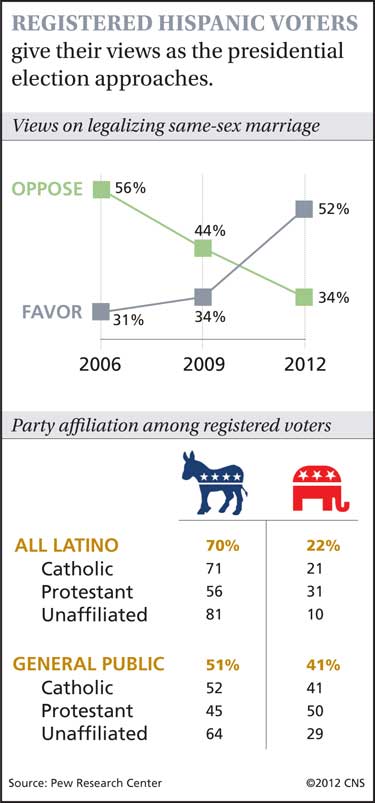WASHINGTON (CNS) — More than 50 percent of Hispanics now favor legalizing same-sex marriage, marking nearly a statistical flip-flop in the six years since the Pew Hispanic Center first began asking that question.
However, majorities of those who attend religious services most regularly continue to oppose such marriages.
In a report released Oct. 18, Pew’s Hispanic Center and its Forum on Religion & Public Life found that 52 percent of Hispanics support same-sex marriage and 34 percent oppose it. Among them, 54 percent of Hispanic Catholics say it should be legal and 31 percent oppose it. Among all Americans, 48 percent favor same-sex marriage, as do 53 percent of all Catholics.
[hotblock]
In 2006, when the organization first asked Hispanics that question, 31 percent favored legalizing same-sex marriage and 56 percent opposed it.
A large majority of evangelical Hispanics remain opposed to same-sex marriage, with 25 percent saying they support it and 66 percent opposed. Among white evangelicals, 19 percent support legalizing such marriages and 76 percent are opposed. In the religion breakouts done by Pew, white evangelicals are the group most likely to oppose same-sex marriage.
Support for same-sex marriage was weaker among Latinos who regularly attend religious services, the report said. Among all Hispanics, 40 percent of those who attend services at least weekly support such marriages, and 47 percent oppose them. Forty-six percent of Latino Catholics who go to church at least weekly said they support same-sex marriage, while 37 percent oppose it.
In the general public, 28 percent of those who attend weekly services support legalizing same-sex marriage and 65 percent oppose it. Among white Catholics who attend church weekly, 39 percent support such marriages and 53 percent oppose them.
One striking difference between Hispanics in the survey and non-Hispanics is the higher rate of “I don’t know” as a response to the question about same-sex marriage. Thirteen percent of all Latinos said they didn’t know how they felt, compared to 9 percent of the general public. Among Catholic Latinos, 15 percent said they “don’t know,” compared to 9 percent of all Catholics.
The Catholic Church opposes legalizing same-sex marriage and teaches that any sexual activity outside of marriage is sinful. The U.S. bishops say that “the attempt to ‘redefine’ marriage to include two persons of the same sex denies the reality of what marriage is,” a “lifelong union of a man and a woman.”
The church teaches that homosexual activity is “intrinsically disordered.” but also says the dignity of homosexual individuals must be respected as well as their rights as people.
The telephone survey was conducted in September and early October. It surveyed 1,765 Latinos and has a margin of error of plus or minus 3.2 percentage points for the entire survey sample and margins of error of between 4.4 and 11.7 percentage points for different subgroups. The report used the terms Latino and Hispanic interchangeably.
In November voters in Washington state, Minnesota and Maryland will decide on legalizing same-sex marriage. In Maine, voters will decide on an initiative on same-sex marriage, three years after a referendum overturned a law passed by the Legislature.
Since 2004, six states have legalized same-sex marriage: Connecticut, Iowa, Massachusetts, New Hampshire, New York, and Vermont, as well as the District of Columbia.
The Pew report released also included data about how Latinos are likely to vote in the presidential election — with 69 percent overall, 75 percent of Hispanic Catholics and 55 percent of Protestant Hispanics likely to vote for President Barack Obama.
It also reported on how often Latinos said they hear about certain topics in church, topics like as abortion, immigration, homosexuality and candidates/elections. More than half, 54 percent, of all Latinos said they hear about abortion; 43 percent said they hear about immigration; 38 percent said they hear about laws regarding homosexuality and 29 percent hear about candidates and elections. It showed little difference between Catholics and evangelicals in those responses.
PREVIOUS: Charter school enrollment surpasses Catholic schools
NEXT: Spokane Diocese accuses law firm that handled bankruptcy of malpractice



Share this story